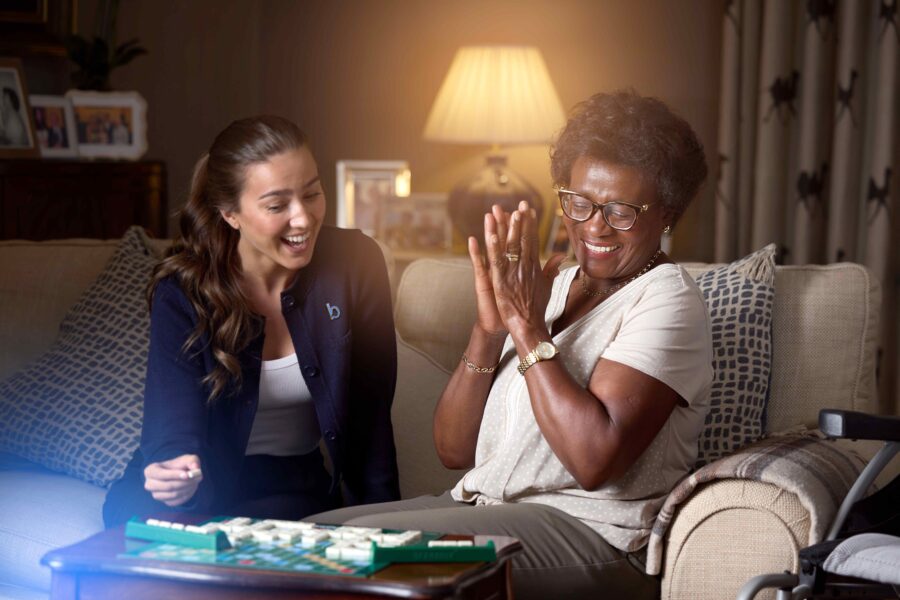

Blog post
Vision loss and dementia

Matthew Burford BSc(Hons) Optometry MCOptom - Domiciliary Optician and Professional Services Manager at OutsideClinic
4-6 minutes
Can dementia affect vision?
Yes, dementia can affect vision, but it’s not always straightforward.
Dementia, particularly Alzheimer’s disease, can lead to changes in the brain that affect how visual information is processed.
This doesn’t necessarily mean that the eyes themselves are damaged, but rather that the brain’s ability to interpret what the eyes see is impaired.

Can you tell if someone has dementia by their eyes?
There are no specific signs of dementia that can be detected in the eyes themselves.
However, some people notice that their loved ones with dementia may have a glassy, glazed, or vacant look and may close their eyes more frequently.
This can happen because the brain struggles to process visual information, leading to a lack of focus or engagement with their surroundings.
Closing their eyes more often might be a way for them to reduce overwhelming sensory input or cope with fatigue and confusion.

Is dementia caused by vision problems?
Vision problems do not cause dementia, but they can exacerbate symptoms.
For example, if someone already has dementia, untreated conditions like cataracts or macular degeneration can lead to increased confusion and isolation.
It’s important to differentiate between the symptoms of vision loss and those of dementia, as they require different treatments.

How can you tell the difference between signs of vision loss and signs of dementia?
Distinguishing between vision loss and dementia can be challenging because the symptoms often overlap. Some of the similar symptoms include:
- Failing to recognise people
- Difficulty with familiar tasks like reading
- Bumping into things
- Misplacing items
- Decreased interest in hobbies or social activities
- Confusion and disorientation
If you or a loved one are experiencing any of these symptoms, booking an eye test can be a crucial first step in understanding the underlying issues and getting the right support.
For more information about recognising the signs of dementia, head over to the Promedica24 website.
https://promedica24.co.uk/news/how-to-spot-signs-of-dementia/

Can someone living with dementia have an eye test?
Absolutely. Regular eye tests are crucial for people living with dementia. An eye test can help identify any treatable vision problems that could be contributing to confusion or a decline in quality of life.
Here at OutsideClinic, our mobile opticians specialise in delivering eye tests at home for those who can't easily visit an optician. Our home eye tests are particularly beneficial for those living with dementia.
Our opticians are trained to support a range of cognitive abilities, including dementia, which allows each individual to receive the best possible care in their own familiar surroundings.
We also purposely have longer and flexible appointments slots which allow us to do the test at a slower pace if needed.
And there is always the option to have a loved one or carer present during the test for added reassurance.

Can dementia be diagnosed during an eye test?
An eye test cannot diagnose dementia, but it can help to rule out other conditions, such as cataracts or macular degeneration, which might cause symptoms similar to dementia, such as confusion or difficulty navigating.

Will glasses help someone living with dementia?
Glasses can certainly help if the person has a correctable vision problem, such as short-sightedness, long-sightedness, or astigmatism.
Ensuring that someone with dementia has the right prescription can improve their ability to see clearly, which in turn can help reduce confusion and frustration.
Clearer vision might also enhance their ability to engage in daily activities, recognise familiar faces, and navigate their environment more safely.

How to help someone with dementia care for their eyes and vision
- The 4 Cs: Always ensure that spectacles are correct (e.g. for near or distant tasks) current, clean and comfortable.
- Regular eye tests: To ensure that problems are detected and treated promptly. The NHS generally recommend that we have our eyes tested every 2 years.
- A healthy lifestyle: By ensuring they have a balanced diet, get enough sleep and avoid smoking.
- Lighting: Provide good lighting in key areas to help with visibility.
- Contrast: Use high-contrast colours to make objects easier to see.
- Background: Minimise visual clutter to reduce confusion.
- Clear obstacles: Keep walkways free of hazards to prevent trips and falls.

Where can I get further support?
We’ve partnered with Promedica24, who are a leading provider of home care services, to support those who wish to maintain their independence at home.
At Promedica24, their person-centred home care services provide bespoke support in familiar surroundings, allowing individuals living with dementia to maintain their independence for as long as possible.
Their carers help with daily tasks, medication management, and providing vital companionship and emotional support.
For more information on Promedica24’s dementia care services, visit their website or call 0800 086 86 86.

By Matthew Burford BSc(Hons) Optometry MCOptom - Domiciliary Optician and Professional Services Manager at OutsideClinic Post last updated 21st October 2024
Matthew graduated from Aston University in 2004 with a degree in Optometry.










